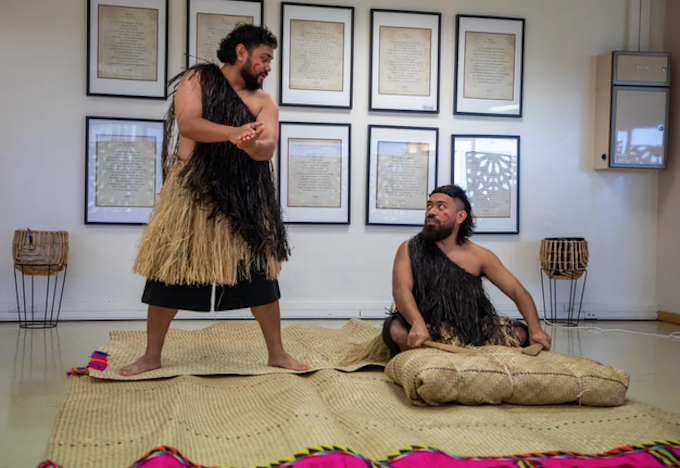
By Grace Tinetali-Fiavaai, RNZ Pacific journalist
Aotearoa celebrates Rotuman language as part of the Ministry for Pacific Peoples’ Pacific Language Week series this week.
Rotuman is one of five UNESCO-listed endangered languages among the 12 officially celebrated in New Zealand.
The others are Tokelaun, Niuean, Cook Islands Māori and Tuvaluan.
This year’s theme is, ‘Åf’ạkia ma rak’ạkia ‘os fäega ma ag fak Rotuma – tēfakhanisit Gagaja nā se ‘äe ma’, which translates to, ‘Treasure & teach our Rotuman language and culture — A gift given to you and I by God’.
With fewer than 1000 residents identifying as Rotuman, it is the younger generation stepping up to preserve their endangered language.
Two young people, who migrated to New Zealand from Rotuma Island, are using dance to stay connected with their culture from the tiny island almost 500km northwest of Fiji’s capital, Suva, which they proudly call home.
Kapieri Samisoni and Tristan Petueli, both born in Fiji and raised on Rotuma, now reside in Auckland.
Cultural guardians
They are leading a new wave of cultural guardians who use dance, music, and storytelling to stay rooted in their heritage and to pass it on to future generations.
“A lot of people get confused that they think Rotuma is in Fiji but Rotuma is just outside of Fiji,” Samisoni told RNZ Pacific Waves.
Rotuman Language Week. Video: RNZ Pacific
“We have our own culture, our own tradition, our own language.”
“When I moved to New Zealand, I would always say I am Fijian because that was easier for people to understand. But nowadays, I say I am Rotuman.
“A lot of people are starting to understand and realise . . . they know what Rotuma is and where Rotuma is, so it is nice saying that I am Rotuman,” he said.
Samisoni moved to New Zealand in 2007 when he was 11 years old with his parents and siblings.
He said dancing has become a powerful way to express his identity and honour the traditions of his homeland.
Learning more
“Moving away from Fiji and being so far away from the language, I think I took it for granted. But now that I am here in New Zealand, I want to learn more about my culture.
“With dance and music, that is the way of for me to keep the culture alive. It is also a good way to learn the language as well.”
For Petueli, the connection runs deep through performance and rhythm after having moved here in 2019, just before the covid-19 pandemic.
“It is quite difficult living in Aotearoa, where I cannot use the language as much in my day to day life,” Petueli said.
“The only time I get to do that is when I am on the phone with my parents back home, or when I am reading the Rotuman Bible and that kind of keeps me connected to my culture,” he said.
He added he definitely felt connected whenever he was dancing.
“Growing up, I learnt our traditional dances at a very young age.
Blessed and grateful
“My parents were always involved in the culture. They were also purotu, which is the choreographers and composers for our traditional dances. So, I was blessed and grateful to have that with me growing up, and I still have that with me today,” he said.
Celebrations of Rotuman Language Week first began as grassroots efforts in 2018, led by groups like the Auckland Rotuman Fellowship Group Inc before receiving official support from the Ministry for Pacific Peoples in 2020.
Interview with Fesaitu Solomone. Video: RNZ Pacific
The Centre for Pacific Languages chief executive Fesaitu Solomone said young people played a critical role in this movement — but they don’t have to do it alone.
“Be not afraid to speak the language even if you make mistakes,” she said.
“Get together [and] look for people who can support you in terms of the language. We have our knowledge holders, your community, your church, your family.
“Reach out to anyone you know who can support you and create a safe environment for you to learn our Pasifika languages.”
Loved music and dance
She said one of the things that young people loved was music and dance and the centre wanted to make sure that they continued to learn language through that avenue.
“It is great pathway and we recognise that a lot of our people may not want to learn language in a classroom setting or in a face to face environment,” she said.
Fesaitu said for these young leaders, the bridge was already being crossed — one dance, one chant, and one proud declaration at a time.
“And that is the work that we try and do here, is to look at ways that our young people can engage, but also be able to empower them, and give them an opportunity to be part of it.”
Petueli hopes other countries follow the example being set in Aotearoa to preserve and celebrate Pacific languages.
“I do not think any other country, even in Fiji, is doing anything like this, like the Pacific languages [weeks], and pushing for it.
“I think we are doing a great job here, and I hope that we will everywhere else can see and follow through with it.”
This article is republished under a community partnership agreement with RNZ.











































